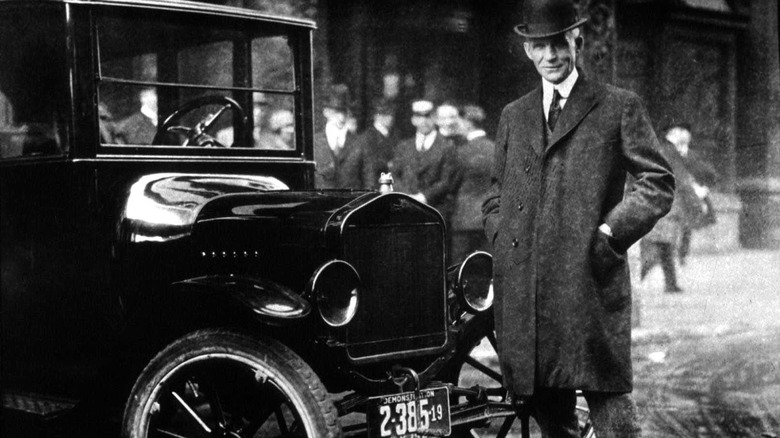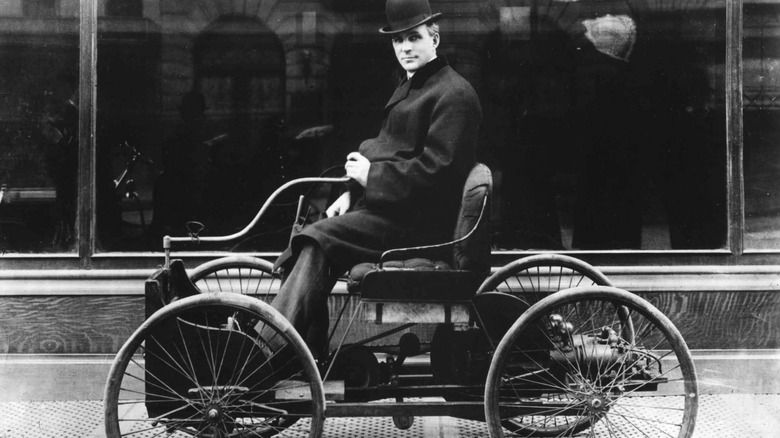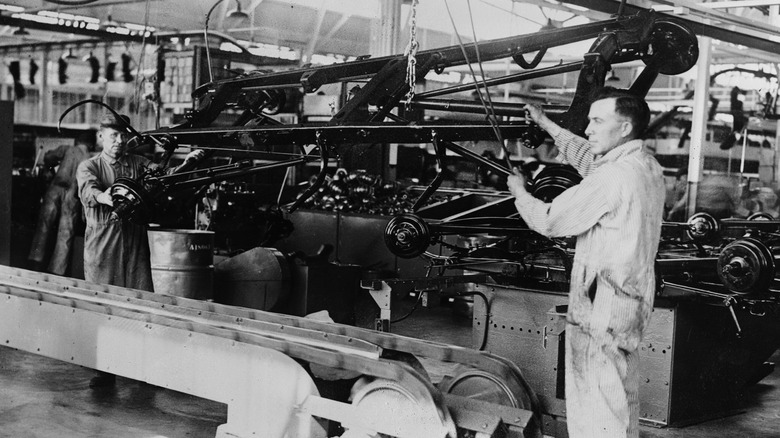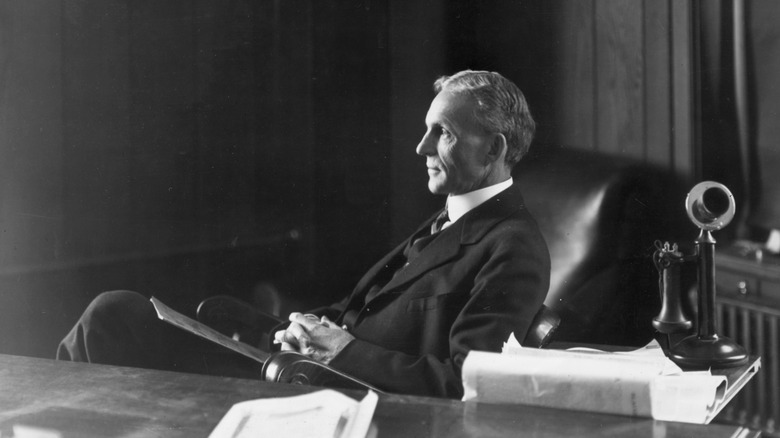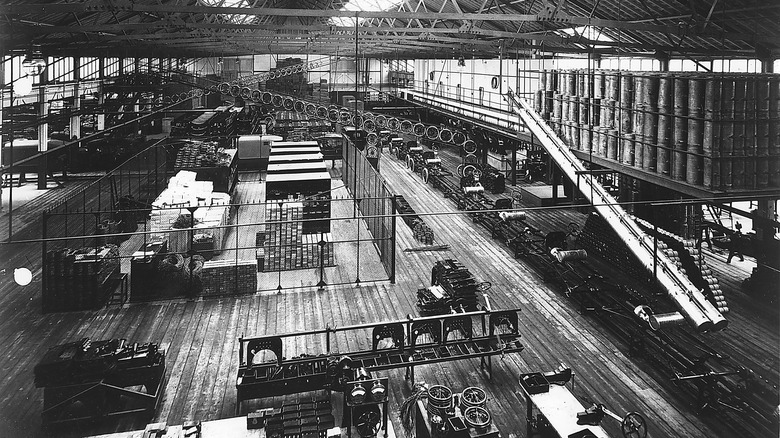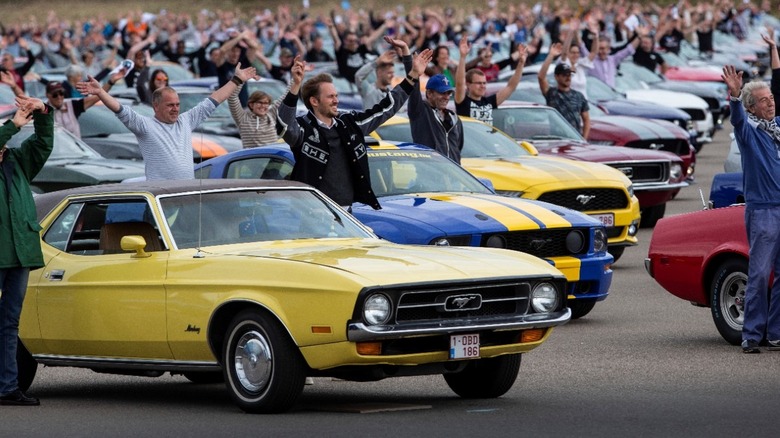Who Was Henry Ford? The Man Behind America's First Major Automotive Giant
Henry Ford didn't create the automobile, but he's often credited with helping to shape the 20th century by making it more widely accessible. Modern car production would likely not exist as it is today without Ford, a businessman and innovator who started off in an ordinary life but became known for extraordinary thinking.
"He was one of these people who didn't take a job because he knew how to do it," said Bob Casey, retired curator of transportation at the Henry Ford Museum in Dearborn, Michigan. "He often took jobs because he didn't know how to do them, and they were opportunities to learn. It's a very gutsy way to learn."
How exactly did Ford go from tinkering in a machine shop to founding the Ford Motor Company? Here's a closer look at who exactly Henry Ford was and what he did that made such a massive impact on both production and life in the United States.
The personal life of Henry Ford
Henry Ford was born in Springwells Township, Michigan in 1836, the son of an Irishman and a Belgian mother, and the eldest of eight children. From a young age, Ford was already about mechanics and spent a lot of time in machine shops as a child. It's said that he constructed his first steam engine by age 15. It only made sense that he became a machinist's apprentice in the 1880s and worked his way to becoming chief engineer at the Edison Illuminating Company of Detroit by 1893. Iconic inventor Thomas Edison became Ford's friend and mentor.
During this time, Ford met Clara Bryant, who lived a few miles from his childhood home. They married in 1888, and had their only child, a son named Edsel, in 1893. Throughout their marriage, Clara had a mission of improving women's lives and created programs focused on women's rights, education, and healthcare. She became active in the suffrage movement in 1918 and helped lead the movement in Michigan.
Henry Ford was focused on automobiles and building engines, leading to his first car, known as the Quadricycle. Sold for $200 in 1896, this rare antique is now valued at over $200,000. In 1901 Ford entered one of his early cars in a 10-mile race and won, setting an American speed record of five miles in 5 minutes, 28 seconds. This got even more people talking about his cars.
What did Henry Ford invent?
Ford created the Ford Motor Company in 1903, selling his first car that same year. He became president by 1906. In 1913, he invented the moving assembly line that revolutionized car manufacturing. The goal was to produce a larger number of vehicles, reducing their cost and making them more affordable. The trick? A conveyer belt to reduce worker movement, instead bringing the product to them to save time and energy. Each car was put together step by step as it was pulled to each stop by a rope (later, a chain). With this method, Ford could build the game-changing Model T in just 90 minutes.
In 1927, Ford's River Rogue factory was complete, fulfilling Henry Ford's vision of finishing entire vehicles from scratch within one complex. It used raw materials supplied by the company, some coming from a Ford-owned rubber plant in Brazil. Thanks to the company's increasing efficiency, Model T prices decreased every year, going from $950 in 1909 down to $360 around 1917 — and production grew from 18,664 to 785,432 cars a year.
Ford discontinued the Model T in 1927 as sales slumped after 15 million were sold. It gave way to Ford's Model A, a larger version of the Model T with new features. Switching to the new vehicle forced some facilities to shut down for months as the company worked to scrap and rebuild nearly 75% of its tools. This cost almost $250 million but kept Ford competitive.
Henry Ford's history of antisemitism
Meanwhile, Henry Ford was harboring antisemitic views that he eventually started spreading across the nation. During World War I, he purchased his own newspaper, the Dearborn Independent, and published antisemitic articles that accused Jews of financing the war. Historians note that it unfortunately wasn't surprising to see antisemitic articles in small-town papers in the 1920s, but Ford's had far more reach, since he placed them in all his Ford dealerships throughout the country.
"What Henry Ford says, people stop and listen," Hasia Diner, a professor of American Jewish history at New York University, told PBS. "There are people who talked about him as a potential presidential candidate in the 1920s. Some local tavern keeper makes an anti-Semitic remark over the bar, well, nobody cares. Somebody may listen, and maybe repeat it, but it has a very limited span. But Henry Ford's ability to gain a national audience with his words made him a very dangerous person."
Ford's words eventually spread abroad as well. A former Third Reich youth leader even mentioned Ford when testifying in the postwar Nuremberg war-crimes trials. The trials' record shows that Baldur von Schirach said: "The decisive anti-Semitic book which I read at that time and the book which influenced my comrades ... was Henry Ford's book, 'The International Jew.'"
Henry Ford's treatment — and mistreatment — of workers
Henry Ford's workplace is often praised due to his production advancements, but that overlooks its controversies over the decades. Despite the production advancements of the moving assembly line, Ford lost workers at a high volume due to boredom of repetitive, simplified tasks, so the company announced the $5 workday in 1914, doubling workers' wages. In the early '20s, the company also started hiring Black workers, but Henry Ford felt they were inferior, so the company segregated them and gave them more dangerous jobs for the same pay.
During World War I, Henry Ford became paranoid about immigrants and unions, leading to him to spy on his employees by sending inspectors to their homes. He couldn't stop unions from forming, however, when the Great Depression hit in 1929, significantly reducing car sales and leading to massive layoffs. In 1932, a hunger march organized by the Young Communist League and the Detroit Unemployed Council attempted to march to Ford's River Rouge factory, but the company's private police force attacked them with guns and water cannons, killing five and injuring 60. That force in 1937 beat up union organizers who tried to pass out leaflets near the plant, even breaking one organizer's back.
Ford was the last major American carmaker to sign a contract with the United Auto Workers, in 1941, due to Henry Ford's growing suspicion that Jews were behind the push for unions and his determination to control employees' wages and working conditions.
Henry Ford's death leaves legacy and controversy
While Henry Ford was a successful businessman and inventor, he also did some shady things behind the scenes as the Model T took over the roads. For instance, Ford's son, Edsel, became the company's president in 1918 — but this was part of one of his father's schemes. A few months later, Henry Ford announced that he was starting a rival automobile company that would sell cheaper Model T's. But there was no rival company. The goal? Get stockholders to sell their Ford stocks over fear of losing sales, so Henry Ford could control all of the Ford Motor Company's stock.
In 1943, Edsel Ford died of stomach cancer at just 49, and Henry Ford was re-elected president of the Ford Motor Company a few months later. But in 1945, he suffered a serious stroke while on a trip to Georgia, affecting his mental and physical health. Edsel's oldest son, Henry Ford II, became president of the Ford Motor Company, and was known for working with union leaders and attempting to make up for his grandfather's antisemitic views.
Henry Ford died in 1947 at age 83, leaving behind a legacy of controversy, violence, and innovation. By the end of his life, Ford's inventions, schemes, and scandals had made his net worth $200 billion. And while the road was rocky, Ford Motor Company grew to be one of the largest vehicle manufacturers in the U.S., creating successful models for over 100 years.
